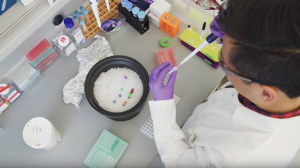NEW YORK (Reuters Health) – Extended use of individual beta-carotene, retinol, and lutein supplements, at doses higher than in multivitamins, increases lung cancer risk, according to data from the Vitamins and Lifestyle (VITAL) prospective cohort study.
High-dose beta-carotene supplements increase lung cancer rates in high-risk individuals, even though carotenoids from dietary sources tend to lower risk, Dr. Jessie A. Satia and co-researchers note in the April 1 American Journal of Epidemiology. “Whether effects are similar in the general population is unclear.”
The researchers analyzed data from 77,126 subjects ages 50 to 76 who filled out questionnaires in 2000-2002 regarding supplement use over the previous decade. The cohort was predominantly white and generally healthy, the authors note, and while there were few never-smokers among the lung cancer cases, there were fewer current smokers in the overall cohort than in the general population.
By linking to the SEER cancer registry, Dr. Satia, at the University of North Carolina at Chapel Hill, and her team identified 521 incident lung cancer cases. They estimated hazard ratios (HRs) for individual supplements after adjusting for age, gender, and smoking history.
For beta-carotene used for at least 4 years, the HRs for total lung cancer and for small-cell lung cancer were 1.18 (p = NS) and 3.22 (p = 0.01).
For retinol, the HR for total lung cancer was 1.53 (p = 0.02). For non-small-cell lung cancer, it was 1.80 (p = 0.002). For lutein, corresponding HRs were 2.02 (p = 0.006) and 2.48 (p = 0.01).
The researchers speculate that “1) these nutrients from supplements may be more bioavailable than those from dietary sources; 2) large intakes may interfere with absorption, transport, and distribution and/or metabolism of other carotenoids or micronutrients that could have offered significant protection; and 3) too high a dose of an antioxidant vitamin may interfere with generation of reactive oxygen species needed for beneficial processes, such as normal immune response and apoptosis.”
They conclude: “Long-term use of individual beta-carotene, retinol, and lutein supplements should not be recommended for lung cancer prevention, particularly among smokers.”
Reference:
Am J Epidemiol 2009;169:815-828.




